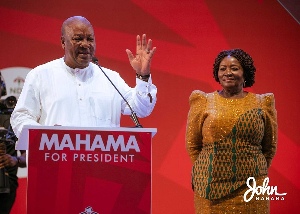Takoradi, Oct. 15, GNA - The Ministry of Energy intends to undertake a feasibility study into the development of an oil refinery for export in the Western Region.
Dr Paa Kwesi Nduom announced this at a press briefing in Takoradi to round off his three-day visit to the region.
He said the anticipated refinery would be bigger than the Tema Oil Refinery and would require a direct and indirect investment of more than 500 million dollars over three to four years.
Dr Nduom said efforts were underway to get funds to purchase a 110-mega watts steam plant component to beef up energy production at the Aboadze Thermal Plant and that this additional facility would require an investment of about 150 million dollars.
He said the Aboadze Thermal Plant produced more power than the Akosombo generating system and as such the Western Region is Ghana's premier centre for electricity generation.
Dr Nduom said the Ministry of Energy had tasked the VRA with the responsibility to put the Osagyefo Power Barge into operation at the Effasu-Mangyea site in the shortest time.
This would mean additional investment of at least 15 million dollars that would bring employment and social infrastructure like electricity, water, clinic and school to the area, he said.
Dr Nduom said one significant component of his Ministry's energy programme was the development of the West Africa Gas Pipeline (WAGP), which was expected to provide a steady and lower cost of cleaner fuel to the Aboadze Thermal Power Station.
He said the WAGP would improve the power production capability of the Volta River Authority (VRA) and help to improve the stability of the interconnected power systems of Benin, Togo, Ghana and Ivory Coast.
Dr Nduom said Ghana was expected to make a capital contribution of 80 million dollars towards the project and that the government was striving to raise the amount so that the project could take off on time. He said the first phase the Rural Kerosene Distribution Improvement programme was underway with 550 surface tanks made available nationwide. Fifty-five of such tanks were in the Western Region, out of which 20 were currently running with the assistance of the Ghana Oil Company (GOIL).
Dr Nduom said the price of kerosene under the programme was 17,500 cedis per gallon as compared with the price of 19,000 to 20,000 cedis on the market.
Dr Nduom said the programme had brought kerosene to the doorstep of many rural dwellers and consumers, adding that under the phase two, 1,100 surface tanks would be distributed to all districts in 2004. He said without abundant and affordable energy, the private sector could not develop and therefore, it was the duty of his Ministry to provide the fuel that would make the private sector engine run efficiently.
Dr Nduom said the ECG and VRA needed to plan ahead in collaboration with the district assemblies to provide power and other infrastructure that would attract business investment.
He said henceforth, the ECG and NED would not demand advance payment of capital contributions from private sector consumers. Dr Nduom said capital contributions would be spread over a period to be negotiated, ranging from twelve to 24 months, depending on the amount involved and should be included in the consumer's monthly bill.
He said to support the Ghana Poverty Reduction Strategy, his Ministry would expand access to electricity, especially in the rural areas through the National Electrification Programme, adding that at present, about 1,000 communities were being connected to the national grid.
The programme includes self-help electrification under which about 650 communities would be connected by the end of the year and the Volta lake Re-Settlement Towns Project, which had connected 144 communities, Dr Nduom said.
Business News of Wednesday, 15 October 2003
Source: GNA












